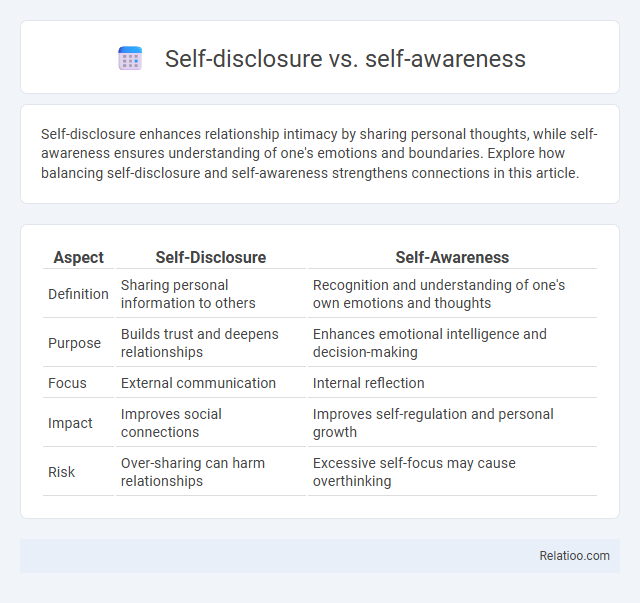Self-disclosure enhances relationship intimacy by sharing personal thoughts, while self-awareness ensures understanding of one's emotions and boundaries. Explore how balancing self-disclosure and self-awareness strengthens connections in this article.
Table of Comparison
| Aspect | Self-Disclosure | Self-Awareness |
|---|---|---|
| Definition | Sharing personal information to others | Recognition and understanding of one's own emotions and thoughts |
| Purpose | Builds trust and deepens relationships | Enhances emotional intelligence and decision-making |
| Focus | External communication | Internal reflection |
| Impact | Improves social connections | Improves self-regulation and personal growth |
| Risk | Over-sharing can harm relationships | Excessive self-focus may cause overthinking |
Understanding Self-Disclosure: Definition and Importance
Self-disclosure involves intentionally sharing personal information, feelings, or experiences with others, fostering trust and deeper relationships. Understanding self-disclosure is crucial as it enhances interpersonal communication, emotional intimacy, and social support networks. Unlike self-awareness, which refers to recognizing one's internal states and traits, self-disclosure actively externalizes this knowledge to build connection and authenticity.
Exploring Self-Awareness: What It Really Means
Self-awareness involves recognizing and understanding one's own emotions, thoughts, and behaviors, serving as the foundation for personal growth and emotional intelligence. Unlike self-disclosure, which is the act of sharing personal information with others, self-awareness is an internal process that enhances decision-making and interpersonal relationships. Developing self-awareness enables individuals to identify their strengths and weaknesses, leading to more authentic and meaningful self-disclosure.
Key Differences Between Self-Disclosure and Self-Awareness
Self-disclosure involves sharing personal information with others, while self-awareness is the conscious knowledge of one's own character, feelings, and desires. The key difference lies in self-disclosure being an outward expression aimed at building relationships, whereas self-awareness is an inward process essential for emotional intelligence and personal growth. Understanding this distinction helps enhance communication and fosters authentic interpersonal connections.
The Role of Self-Disclosure in Building Relationships
Self-disclosure plays a crucial role in building relationships by allowing you to share personal thoughts, feelings, and experiences that foster trust and intimacy between individuals. While self-awareness involves understanding your own emotions and behaviors, self-disclosure is the deliberate act of revealing that internal knowledge to others, which strengthens bonds and facilitates mutual understanding. Effective self-disclosure balances openness with boundaries, enhancing communication and creating deeper, more meaningful connections.
How Self-Awareness Influences Communication
Self-awareness profoundly shapes communication by enabling individuals to recognize their emotions, biases, and reactions, leading to more intentional and clear interactions. Higher self-awareness fosters empathy and active listening, which enhance mutual understanding and reduce conflicts. This introspective insight balances self-disclosure by helping people share relevant information appropriately, fostering trust without oversharing.
Benefits of Practicing Self-Disclosure
Practicing self-disclosure enhances emotional well-being by fostering trust and deepening relationships through authentic communication. Your openness promotes self-awareness, enabling clearer insight into personal feelings and values, which strengthens social connections. Sharing personal experiences encourages empathy and support, creating a foundation for meaningful and supportive interactions.
The Impact of Self-Awareness on Personal Growth
Self-awareness serves as the foundational element that enhances personal growth by enabling individuals to recognize their thoughts, emotions, and behaviors accurately. This heightened awareness allows for intentional self-disclosure, where sharing authentic feelings and experiences fosters deeper connections and trust in relationships. Ultimately, the interplay between self-awareness and self-disclosure promotes emotional intelligence, resilience, and continuous self-improvement.
Balancing Openness and Introspection
Balancing openness and introspection requires understanding the distinctions between self-disclosure, self-awareness, and self-reflection. Self-disclosure involves sharing personal information with others, fostering connection and trust, while self-awareness is your ability to recognize and understand your own emotions and behaviors. Self-reflection deepens this insight by critically evaluating your experiences, helping you to disclose authentically without oversharing or neglecting personal boundaries.
Overcoming Barriers to Self-Disclosure and Self-Awareness
Overcoming barriers to self-disclosure involves fostering trust and ensuring emotional safety, which encourages honest communication while reducing fear of judgment or rejection. Enhancing self-awareness requires consistent reflection and mindfulness practices that help individuals recognize their emotions and motivations, improving their ability to share authentically. Both processes benefit from intentional vulnerability and supportive environments, leading to deeper interpersonal connections and personal growth.
Practical Tips for Enhancing Both Skills
Enhancing your self-disclosure involves gradually sharing personal thoughts and feelings in safe environments, fostering trust and deeper connections. To improve self-awareness, practice mindfulness and regularly reflect on your emotions and behaviors to gain clearer insight into your internal state. Combining these skills effectively encourages authentic communication and strengthens interpersonal relationships.

Infographic: Self-disclosure vs Self-awareness
 relatioo.com
relatioo.com